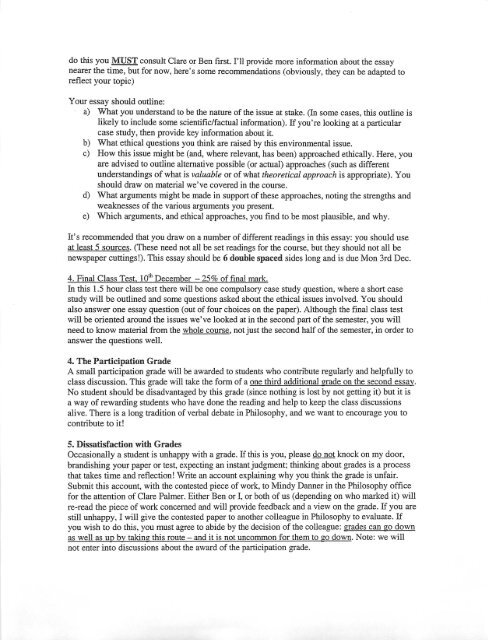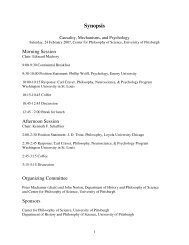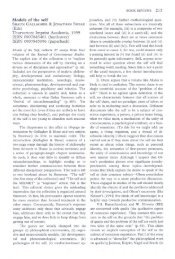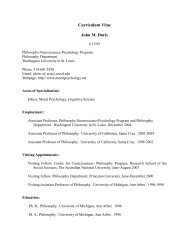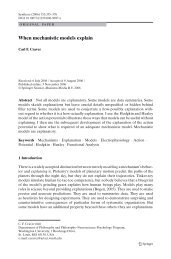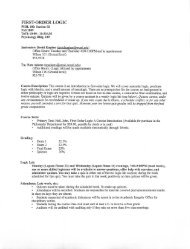CLASS SYLLABUS: INTRODUCTION TO ENVIRONMENTAL ...
CLASS SYLLABUS: INTRODUCTION TO ENVIRONMENTAL ...
CLASS SYLLABUS: INTRODUCTION TO ENVIRONMENTAL ...
You also want an ePaper? Increase the reach of your titles
YUMPU automatically turns print PDFs into web optimized ePapers that Google loves.
do this you MUST consult Clare or Ben first. I'll provide more information about the essay<br />
nearer the time, but for now, here's some recommendations (obviously, they can be adapted to<br />
reflect your topic)<br />
Your essay should outline:<br />
a) What you understand to be the nature of the issue at stake. (In some cases, this outline is<br />
likely to include some scientific/factual information). If you're looking at a particular<br />
case study, then provide key information about it.<br />
b) What ethical questions you think are raised by this environmental issue.<br />
c) How this issue might be (and, where relevant, has been) approached ethically. Here, you<br />
are advised to outline alternative possible (or actual) approaches (such as different<br />
understandings of what is valuable or of what theoretical approach is appropriate). You<br />
should draw on material we've covered in the course.<br />
d) What arguments might be made in support of these approaches, noting the strengths and<br />
weaknesses of the various arguments you present.<br />
e) Which arguments, and ethical approaches, you find to be most plausible, and why.<br />
It's recommended that you draw on a number of different readings in this essay: you should use<br />
at least 5 sources. (These need not all be set readings for the course, but they should not all be<br />
newspaper cuttings!). This essay should be 6 double spaced sides long and is due Mon 3rd Dec.<br />
4. Final Class Test. 10th December - 25% of final mark.<br />
In this 1.5 hour class test there will be one compulsory case study question, where a short case<br />
study will be outlined and some questions asked about the ethical issues involved. You should<br />
also answer one essay question (out of four choices on the paper). Although the final class test<br />
will be oriented around the issues we've looked at in the second part of the semester, you will<br />
answer the questions well.<br />
4. The Participation Grade<br />
A small participation grade will be awarded to students who contribute regularly and helpfully to<br />
class discussion. This grade will take the form of a one third additional grade on the second essay.<br />
No student should be disadvantaged by this grade (since nothing is lost by not getting it) but it is<br />
a way of rewarding students who have done the reading and help to keep the class discussions<br />
alive. There is a long tradition of verbal debate in Philosophy, and we want to encourage you to<br />
contribute to it!<br />
5. Dissatisfaction with Grades<br />
Occasionally a student is unhap<br />
brandishing vour Daner or test, exoecting an instant iudgment: thinking about grades is a Drocess<br />
that takes time and reflection! Write an account explaining why you think the grade is unfair.<br />
Submit this account, with the contested piece of work, to Mindy Danner in the Philosophy office<br />
for the attention of Clare Palmer. Either Ben or I, or both of us (depending on who marked it) will<br />
re-read the piece of work concerned and will provide feedback and a view on the grade. If you are<br />
still unhappy, I will give the contested paper to another colleague in Philosophy to evaluate. If<br />
you wish to do this, you must agree to abide by the decision of the colleague: grades can go down<br />
as well as ud bv taking this route - and it is not uncommon for them to go down. Note: we will<br />
not enter into discussions about the award of the participation grade.


